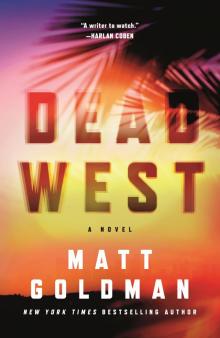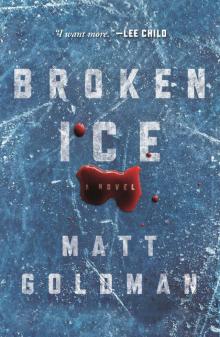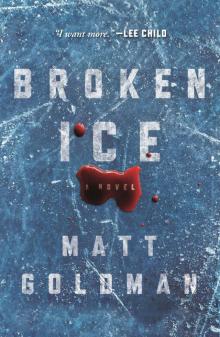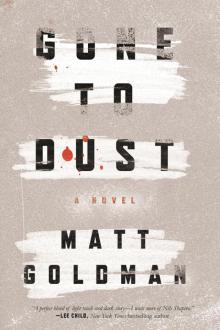- Home
- Matt Goldman
The Shallows--A Nils Shapiro Novel Page 20
The Shallows--A Nils Shapiro Novel Read online
Page 20
Luke consulted with his lawyer. They whispered back and forth for half a minute. The room was so small we could all hear snippets of “Do I have to answer?” and “No, you don’t have to say anything” and “Any information you can give is helpful” and “I want to stop this now.” Then Luke turned to me and said, “I just was.”
I said, “Okay. Did you try to break into Robin Rabinowitz’s house the night Arndt Kjellgren was apprehended outside?”
“Yes.”
“Why?”
“I thought Todd Rabinowitz might have kept more evidence of my past in the house.”
“How did you break Arndt Kjellgren out of jail?”
Detective Irving from the GLMPD rubbed a crease in his forehead.
Luke said, “I was wearing the same disguise I used to deliver the gas. When I met him at his studio, I raved about his sculptures. Kind of bonded with the guy. So when I showed up outside his cell window, I told him I’d come to rescue him. That I knew he had to be innocent. So I sawed Kjellgren out with a string saw.”
“But the bars were covered by plexiglass. How did you remove the plexiglass in order to pass the string saw through the bars?”
“With a screwdriver.”
“What kind of screwdriver?”
“I don’t know. Just a screwdriver.”
“That’s impossible. The screw heads had a proprietary indentation. Removing them took a special tool. Who gave it to you?”
Luke Tressler said, “I’m done answering questions. I want to leave now.”
“That’s up to Agent Milton. And get used to it, Luke, because everything you do from now on will be up to someone else. When you eat. When you sleep. When you take a shit. And that’s too bad, because I don’t know if you did any of the things you’ve confessed to.”
“I did all of them,” said Luke. “You should know. You saw me in Kjellgren’s building right after I delivered the gas. I told you how to get to his studio. You saw my arms.”
“Scars are easy to fake.”
“The FBI found my ponytail and beard and brown contacts in my condo. It was me. They found my fingerprints on fragments of the bomb. Because I made that bomb.” The Chanel lawyer whispered something into Luke’s ear. He said, “No. They need to know. I bought the fishing stringer I used on Todd with a credit card. You can look it up. I did all of it. And I don’t regret any of it. This country is going to hell. It needs martyrs like me to make things right. I’m proud to go to prison. Hell, I’m proud to die for my cause if that’s what it takes.”
“Martyr,” I said. “Interesting word.”
We went back and forth a bit longer, but Luke said nothing more of value. The interview ended. Everyone went their separate ways, except for Ellegaard, Gabriella, and me. At Colleen Milton’s request, we met with her and Agent Peterson in her office as rush-hour traffic clogged the tangle of freeways below.
Colleen Milton looked at me and said, “I think it’s possible Luke Tressler worked alone. But you don’t?”
“No. For no other reason than he’s too stupid.”
Ellegaard agreed.
Delvin Peterson said, “So you think Luke is working with Ian Halferin or Karin Tressler?”
“Or both?” said Milton.
I stood by the window and looked down on the main gate to the FBI building. A maroon Lincoln was parked around the corner on James Circle. Hiring the most loyal people does not mean hiring the most intelligent. I said, “Ellie, take a look.”
Ellegaard looked out the window, then said, “Can we please borrow a pair of binoculars?”
I said, “I don’t know who Luke is working with. But I do know Ian Halferin is keeping me close for no good reason. Karin Tressler is, too.”
“Well,” said Gabriella, “since you’re close, you know what to do.”
“Do I have the full cooperation of Minneapolis PD and the bureau?”
Colleen Milton and Gabriella Núñez huddled in a cloud of whispers as an underling entered the room and handed me a pair of binoculars. I aimed them at the maroon Lincoln. The windows were too tinted for me to make out who was inside. But I could see the license plate. I fed the number to Agent Peterson. He opened his laptop. Then I handed the binoculars to Ellegaard.
Special Agent Coleen Milton said, “You have our cooperation, Shap. But only because you’re already on the inside with both Halferin Silver and Karin Tressler.”
“You called me Shap,” I said. “That’s cozy.”
“You have our cooperation to a point,” said Milton. “Don’t push it.”
34
I pulled out of the FBI parking lot with Ellegaard riding shotgun. We spotted the maroon Lincoln just after merging onto Highway 100—the driver should have been ashamed. I signaled to exit on Bass Lake Road, and the Lincoln followed. Just before the exit, I jerked back into traffic. So did the Lincoln. I repeated the process at both the Forty-second Street exit and then again at the Duluth Street exit. The tail fell for it both times. If I were driving the maroon Lincoln I would have accepted defeat and backed off, but as I’d already guessed from my vantage point in the FBI building, the driver wasn’t all that concerned with stealth.
We continued south on Highway 100 then I cloverleafed east on 394 and headed toward downtown. The Lincoln was right behind me.
Ellegaard said, “I’m sorry, Shap.”
“About what?”
“I’ve laid back on this case. Let you and Annika do everything.”
“What are you apologizing for? You’re running the company.”
Ellegaard said, “That doesn’t excuse my absence. I should have been more hands-on.”
“You’re hands-on right now. I can’t pull off this little trick without you.”
“I mean before now.”
I said, “I don’t know how you could have been hands-on. Robin Rabinowitz asked for me specifically. Annika befriended Celeste to work that angle. Ian Halferin assumes I’m his friend because I was bar mitzvahed. And my big mouth somehow endeared me to Karin Tressler.”
Ellegaard smiled. “Now you’re making me feel not needed.”
“The company would fall apart without you. Besides, it all evens out in the end.”
“I suppose.”
“If you really feel like you’re not contributing, you could straighten up my office.”
Ellegaard laughed as I moved into the left lane for the downtown exits. Then a quarter mile before the Dunwoody-Hennepin Avenue exit, I cut right, straight across four lanes of traffic, drawing no less than three one-finger salutes, accompanied by horns honking and screeching brakes. The Lincoln followed. I accelerated down the exit ramp.
I said, “Ready?”
“Ready,” said Ellegaard.
Fifty feet before the awaiting green light, I slammed on my brakes, and the Lincoln rear-ended me.
I jumped out of the Volvo and turned around. Ellegaard joined me, one hand on his body-holstered Glock. Whoever was driving the Lincoln had a face full of airbag. I ran back, yanked open the driver-side door, pushed down the airbag, hot to the touch, and saw a broken, bloody nose. It belonged to Blake Lamb.
Karin Tressler’s head of security said, “You fucking asshole, Shapiro!”
“You could have just called if you want to talk to me.”
Blake Lamb touched his nose and said, “Fuck!”
Ellegaard said, “I see cartilage.”
“God dammit!”
I said, “Uh-oh. The cops are here. Better have your license and registration.”
The cops were already there because they expected us. It was Gabriella’s idea. And an excellent one. Blake Lamb jerked his head around and saw the flashing cherries of three Minneapolis PD squad cars. “Good. You’re fucking toast, Shapiro.”
“Toast? What’s wrong with toast?”
Ellegaard said, “I like toast.”
Blake Lamb said, “Fuck. You. Both.”
A uniformed officer leaned into our talk space. She stood about six feet tall, had s
hort hair, and a broad face. She said, “Sir, are you able to talk?”
“You’re fucking right I am.” Blake Lamb pointed to me. “And this fucking asshole slammed on his brakes in front of me for no reason.”
“Well, sir, that’s why we recommend you follow at one car length for every ten miles per hour.” The officer turned to another uniform. “Call an ambulance. This one’s going to the hospital.”
“I’m fucking fine!” said Blake Lamb. “I’m not going anywhere!”
“Sorry, sir. Not your call. You’re going to the hospital, then you’re coming downtown.”
“Downtown? What the hell for?”
“Careless driving, sir.”
“What?! It’s Shapiro’s fault! Take him downtown!”
It went on like that for another minute, then two police officers escorted Blake Lamb to an arriving ambulance. When it pulled away, the tall, broad-faced officer handed me Blake Lamb’s keys and said, “I don’t know what this is about and I don’t want to know.” She looked at Ellegaard. “Is this gentleman taking your Volvo?”
“I am,” said Ellegaard. “Thank you, officer.”
“Don’t thank me. This did not happen.” The officer went back to her car.
Ellegaard put a hand on my shoulder. “You sure you’re okay doing this next bit alone?”
“I don’t see any other way. They need to think I’m him, at least for a little bit.”
Ellegaard nodded. “Be safe. There’s a baby who needs you.”
Blake Lamb’s maroon Lincoln smelled of expensive leather and cheap cologne and whatever exploded to inflate the airbag. I pushed the coarse fabric down between my knees, started the car, and pulled into traffic. One of the front tires rubbed on something when I made a hard right, but other than that, it drove fine.
I turned south on Hennepin to Franklin then turned right and caught Lake of the Isles on its northern tip and passed its mansions old and new, turned off at Dean Parkway, then headed west on Lake Street at Bde Maka Ska, the lake formerly known as Calhoun. I meandered south and west, taking turns for no reason other than they were in one of those two directions.
My indirect route gave the sun time to set and me time to think. Law enforcement wanted the mastermind bomber. I wanted the mastermind killer of Robin Rabinowitz. They wanted a closed case. I wanted to avenge the death of a person I liked and ease my guilt over leaving her bed before the sun rose. If I had stayed, Robin Rabinowitz might still be alive. Arndt Kjellgren might be, too.
To achieve both our ends, the FBI and Minneapolis PD gave me access I wouldn’t have otherwise had. Driving away from the “accident” in Blake Lamb’s Lincoln was unethical and probably illegal and just what I needed to get where I wanted to go.
It was all one big transaction. An exchange of currencies. But every relationship is. Professional and personal. Love for security. Sex for love. A need to lead for a need to follow. A deal is made but not voiced in words or even conscious thoughts. But it’s there, and its contract holds the parties true. I will protect you. I will love you. I will sleep with you. I will be amazed by you. I will worship you. I will let you hurt me.
A swarm of news vans and their people blocked the mansion’s entrance. I hit the horn and hoped Brian Lamb’s sunglasses and Hazeltine CC hat would do their jobs. The press parted, and I pulled into the driveway and stopped before the iron gate. The camera mounted on the limestone post saw what someone wanted it to see. The iron gate opened. I pulled forward. On the right side of the house, the ivy parted, exposing what had to be a ten-car garage. I drove between the greenery and parked the Lincoln in an open spot.
I entered the house through the garage service door and passed through a room with a limestone floor and walnut lockers. A mudroom for people who never step in mud. I continued through and into a large kitchen that looked like what you’d see in a restaurant. Stainless steel industrial appliances, overgrown metal bowls and pots. The maid from Downton Abbey filled a silver tray with dainty teacups and a matching pitcher. Karin Tressler must have had another, more residential-looking kitchen for her late-night bowl of meat sticks or whatever paleo dieters snack on.
Hawkins the butler, napkin tucked into his collar, ate his dinner standing at a counter. He said, “Mr. Shapiro. My apologies. I wasn’t expecting you.”
“No need to apologize. I drove in with Blake Lamb. He’s around here somewhere but I seem to have misplaced him.”
Hawkins smiled knowingly, as if I’d referred to something that happens often. “Perhaps I can help you find Mr. Lamb.”
“He was a bit steamed about something. I’d rather let him go wherever he went. Besides, Ms. Tressler is expecting me.” Hawkins’s scrunched forehead said that was news to him. I said, “There’s some kind of P.R. emergency. She sent Blake Lamb to fetch me. Then he dumped me in the garage and told me to find her.”
Downton Abbey carried the tray out of the kitchen.
“I see,” said Hawkins. “I’ll be happy to—”
“No, no. Don’t interrupt your dinner. I’ll find her.”
I strode out of the kitchen and heard Hawkins jumping off his stool behind me. “But sir…”
I spotted Downton Abbey’s gray-clad backside turning a corner. I followed and saw her descending a wide, carpeted staircase.
The basement level of Karin Tressler’s mansion was as presentable as the above-ground levels, the only difference being it lacked windows. I guessed she was down there to avoid the probing cameras camped outside her gate. Downton Abbey passed through a large party room. It had a long bar with a dozen bar stools and a nine-foot billiards table. There were leather couches and chairs clustered in groups and it all sat on carpeting of red and green plaid. Oil paintings featuring English hunting scenes hung on the walls in heavy, gold-painted frames. It reminded me of the casual space in a country club in that it was formally informal.
The tea carrier passed through the party room toward a pair of double doors. As she pushed her way in, the sounds and flickering light of a movie escaped. I hid behind the massive bar and waited for her to leave. A minute after she did, I entered Karin Tressler’s home theater.
“Blake?” said Karin Tressler. My eyes hadn’t adjusted to the dark. A black-and-white movie flickered on the screen. Something with Gary Cooper and Patricia Neal at a construction site. “Blake, why haven’t you responded to my texts?”
The home theater had twenty seats, each a heavy recliner with cup holders in the armrests. Karin Tressler sat in the second-to-last row. No one else was in the theater. Just before I sat in the seat next to her I said, “I’m not Blake, Ms. Tressler. I’m Nils.”
“Oh.” She sounded surprised but not upset.
“I called but couldn’t get through to you.”
She grabbed a remote and pushed a button. I expected lights and an alarm, but the movie disappeared, replaced by a screen showing the home theater’s options. Colored icons on a black background. The room was now even darker.
Karin Tressler said, “I haven’t taken any calls except from lawyers, politicians, and donors.”
“Well, I’m certainly none of those.”
She laughed. “No, Nils. You are none of those.” She took a sip of tea, only it wasn’t tea. It was gin. Ice tinkled in the glass, and it smelled like a pine tree. She said, “Can I offer you a drink?”
“Eh, boy. I’d love one, but I probably shouldn’t.”
“You’re working.”
“Unfortunately.”
She said, “Some private detective you are.”
“No shit.”
“Well, I can’t be in too much trouble or the police would be here.”
“That’s to be determined.”
“So that’s why you’re here.”
The door opened and two men entered. One spoke. It was Hawkins. “I’m terribly sorry to interrupt, ma’am, but we have a situation. It seems that private detective who was here earlier has breached the house. We’re searching—”
“It’
s all right, Hawkins. I found him.”
“Ma’am?” Hawkins’s eyes hadn’t yet adjusted.
“He’s here. Right beside me. We’re chatting.”
“Would you like me to—”
“No, Hawkins. Please leave. Everything’s fine.”
Hawkins hesitated.
Karin Tressler held up the remote. “I’ll buzz you if I need anything.”
Another pause, then Hawkins said, “Very well, ma’am.” Hawkins and his muscle turned around and exited the theater.
Karin Tressler took a sip of gin then said, “You’re not here to hurt me, are you?”
“Not my style.”
“That’s good. Because I suppose I deserve to be hurt.”
“Why’s that?”
“Something’s wrong with Luke. Something’s been wrong with him since he was a boy. My family didn’t make him like that. He was born that way.” She took another sip of gin. The big screen went into screensaver mode, a swirl of shifting shapes, all some shade of blue. Karin Tressler said, “When you get a puppy who grows up to be an aggressive dog, one that’s not safe even around its owner, you give it to someone who lives on a farm so it can run wild and do what it does. Or, more likely, you put it down. Because you can’t take the risk it will hurt someone. You write it off as crazy or evil or whatever you want to call it and you take it out of this world. But what do you do when it’s not a dog? What do you do when it’s your brother?”
“What you did was keep him close.”
“Luke’s crazy, but not clinically. He didn’t do well in school. He’s never held a job. Can’t make a relationship work. And of course, he blames everybody else. It’s all just one big conspiracy to keep him down. He can’t face the fact he’s not capable. And it doesn’t help that our father bought Luke into private schools and a good college. That just made him a bigger failure compared to his friends.”
The screensaver shifted to purple shapes. I said, “What you’re talking about right now is why I’m here.”

 The Shallows--A Nils Shapiro Novel
The Shallows--A Nils Shapiro Novel Dead West
Dead West Broken Ice
Broken Ice Broken Ice--A Novel
Broken Ice--A Novel Gone to Dust
Gone to Dust